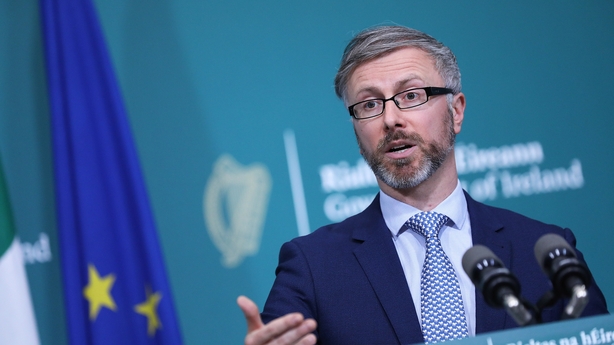The Minister for Children has said everything will be done to ensure the remains of babies buried on the site of the former mother-and-baby home in Tuam, Co Galway, are recovered and united with their loved ones.
However, Roderic O'Gorman said the Government had to be realistic and honest about the scientific challenges of the excavation, which he said will be "one of the most complex forensic excavation and recovery efforts ever undertaken not only in Ireland but anywhere in the world".
He said it would encompass a DNA identification process "on a scale never done before in Ireland".
The minister was speaking after the Cabinet agreed to the Institutional Burials Bill, which provides a lawful basis for a forensic excavation, recovery and analysis of remains at the site of the former institution in Tuam and other sites.
It will allow DNA-based identification to be undertaken to reunite families with the remains of their loved ones, and "will ensure that the children there have the dignified burial that has been denied to them for so long".
"I can let go now. The babies are being taken out of the sewage tank. Finally it's closure" Catherine Corless at the Tuam Babies site in Galway with her 7 grand children @rtenews #Tuambabies pic.twitter.com/s7FUX8pXX5
— Teresa Mannion (@TeresaMannion) February 22, 2022
The Bill contains a number of changes from earlier drafts of the legislation, including removing earlier restrictions on the jurisdiction of the coroner:
"Nothing in this legislation will prevent inquests or investigations into the deaths at Tuam," the minister said.
Research by historian Catherine Corless revealed that 796 children, most of them infants, died between 1925 and 1961, the 36 years that the home, run by the Bon Secours existed.
But the minister said he cannot make any predictions around how many remains will be found.
"We are designing this legislation to ensure that every set of remains is recovered and is identified and potentially linked to somebody. We are not just looking at the septic tank, we are looking at the entire site in Tuam," he said.
Ms Corless said survivors of the home are "quite happy" following today's announcement.
"All in all, I think survivors are quite happy with the results," she said.
Speaking to RTÉ's Drivetime, Ms Corless said: "I was expecting the usual delays and complex issues and that kind of language, but instead of that he (Minister O'Gorman) was very forthcoming and he has delivered exactly what myself and the survivors have asked of him and the Government.
"I'm just relieved because I was at the stage, wondering what on Earth else I could possibly do to get the Government to start into this.
"Thanks to all the people in Ireland throughout the years who have done their utmost themselves to support me."

The Government today also approved the programme for 2022's events as part of the Decade of Centenaries.
Tánaiste Leo Varadkar said there would be an event to mark the 100th anniversary of the foundation of the free state.
On the Civil War, there will be an event with a "neutral date" to remember all those who died and fought in the civil war.
The full programme will be announced shortly.
The long-awaited Assisted Human Reproduction Bill was also approved for publication and this will be published soon by the Minister for Health.
Government also approved the carbon budgets and the Shannon Estuary Economic Taskforce.
The carbon budgets are part of a road map of actions that are set out in the Climate Action Act, which commits Ireland to reach a legally binding target of a climate neutral economy no later than 2050, and a reduction in emissions of 51% by 2030 compared to 2018 levels.
The average annual reduction proposed over the first five year programme is 4.8%, with a 8.3% average for the second period and 3.5% for the final period between 2031 and 2035.
Additional reporting: Mícheál Lehane and Sandra Hurley





